Simon Guerrier's Blog, page 8
March 6, 2025
In the Wet, by Nevil Shute
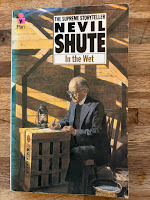 This is an odd and very racist — novel, first published in 1953 but largely set 30 years later. The reprint I read is from 1982, with cover art by George Sharp that conveys a scene in the opening pages but doesn’t really give a sense of this peculiar book at all.
This is an odd and very racist — novel, first published in 1953 but largely set 30 years later. The reprint I read is from 1982, with cover art by George Sharp that conveys a scene in the opening pages but doesn’t really give a sense of this peculiar book at all.How racist can it be, you ask, given that I often delve into old books (and films and TV shows) that can contain unwitting and/or witting prejudice. In fact, I came to this by chance having read a bunch of books from the same year: Farewell Crown and Good-bye King by Margot Bennett, Hackenfeller’s Ape, by Brigid Brophy and, less recently, Casino Royale by Ian Fleming.
Well, In the Wet features a fair amount of casual racism littered through its pages - more, I think, than those other novels. But on top of that, of the novel’s two protagonists, one insists that his friends, employers and love interest address him by a nickname, which is a word beginning with N.
His (white) love interest, Rosemarie Long, is initially wary of using this nickname. “It’s pretty mean to call you that,” she says. “Not many people do that, do they?”
“Everybody,” responds the man born David Anderson, the name that I’ll use here. “I rather like it.”
David’s grandmother, we learn, was an Australian aborigine from the Kanyu tribe, who “ruled the Cape York Peninsula before Captain Cook was born or thought of.” David is proud of being a “quadroon”, and would rather people called him by the nickname and so acknowledge the colour of his skin, “than that they went creeping round the subject trying to avoid it.” (All quotations from p. 82) Better, it seems, to address the thing head on, in a plain-speaking, no-nonsense way.
Except that one of the first people to refer to David’s skin colour doesn’t realise he is is not white.
“You don’t look coloured. You look a bit tanned, that’s all.” (p. 70)
That may account for why David has experienced little in the way of racism, saying that just once, aged 18 and in Sydney, he experienced, “waiters being rude in restaurants, people refusing to sit at table … But it could still happen at any time” (ibid).
We don’t see racism towards David — in fact, many white characters insist to him that his colour and background are not an issue. But he has internalised prejudice, I think. Now aged 30, he is not married because “the colour makes that a bit difficult” (p. 71). He also assumes that it will bar him from working as a pilot for the royal family. David’s boss, Group Captain Frank Cox, counters that,
“As for the colour, you can put that out of your mind [as] we aren’t asking you to marry into the Royal Family” (ibid).
Which would, it seems, be quite unthinkable.
Then upshot is that the only prejudiced person we meet is the character of mixed heritage, who insists on being addressed by the N-word. That word therefore features frequently, more often than I think I’ve ever seen in one book, in a novel written by a white emigrant to Australia, lecturing us on race and democracy and a whole lot besides.
Shute does this through parable or satire, in rather the style of News from Nowhere by William Morris (in which a character from 1890 traipses into the 21st century). The mechanism Shute uses to jump 30 years into the future from his own time is quite peculiar.
The novel opens from the perspective of our first protagonist, 63 year-old Father Roger Hargreaves (no, not the one from the Mr Men), who was born in Portsmouth in 1890, ordained in 1912 and has been in Australia on and off since just after the First World War. He’s a no-nonsense type of vicar, living a meagre existence in a town in the midst of nowhere, North Queensland, tending to lost souls. When an old drunk abuses him, Hargreaves offers the man his own modest home for a wash and shave, and then buys him a drink.
This old drunk is “Stevie”, who lives an even more remote existence with a man called Liang Shih, who grows vegetables for the community and shares his opium with Stevie. One day, Liang Shih comes into town to report that Stevie is seriously ill. Hargreaves joins local nurse Sister Finlay in heading out to see the patient. It’s a perilous journey through rain and flood, and Hargreaves is anyway suffering the after-effects of malaria. They find Stevie on death’s door and, unable to do anything themselves for his pain, they let Liang Shih feed him a pipe. A feverish, smoke-addled Hargreaves sits with the dying man in the dark and listens to him murmur something about his life…
We segue, seamlessly, from Hargreaves telling this story on page 60 to the third person account of David Anderson, the man who likes to be known as N—. Hargreaves thinks this is Stevie’s real name. But we are gifted clues over the next 15 pages that something else is going on, before on page 75 there’s a reference to a coin dated 1982. This is all a vision of things to come.
It’s an odd future, one in which the Labour Government have been in power in the UK continuously since the end of the Second World War. All buildings are government owned and many houses stand empty because there has been so much emigration to Australia, Canada and other parts of the world, much of it after the stock market crash of 1970.
David Anderson is a pilot with the Royal Australian Air Force who, while stopped off in the UK, is asked to take a posting to fly the Royal family wherever they might want to go. It turns out that the RAAF and Australian government are picking up the tab for the Queen’s because the UK’s mean-spirited Labour lot won’t pay. We come to realise the nightmare prospect — has there every been anything so horrific in all fiction? — that the Queen and her family might be happier living abroad (following the example of the author, who emigrated to Australia in 1950).
The whole thing is a very strange right-wing fantasy of grievances against the left, blaming Labour for post-war austerity and not, er, the Nazis. Rationing is still in place in this 1983, so English people are amazed by David’s access to ham or pineapple, which he gets via airline connections. And yet in this bleak dystopia, posh grocer’s Fortnum and Mason is still open (p. 203), when David wants to buy his love interest a treat. By which he means South Australian sherry.
This imagined austerity is all the odder because Shute must have known while writing this that rationing would soon end in the UK. In fact, bread came off the ration in 1948, clothes in 1949, sweets and sugar in 1953, the year In the Wet was published. All other rationing was ended on 4 July 1954, but had been a pledge of the Conservatives in the 1950 and 1951 general elections — the latter returning them to power.
When In the Wet was published, Labour had been out of office for two years. That it is railing against a demonstrably unfounded fear is fascinating in the context of having just read How They Broke Britain by James O’Brien, and its account of scaremongering by media and certain politicians in the lead up to the referendum on leaving the EU.
There’s something, too, in the fear of a population of hard-working, aspirational Brits being dogged by the edicts — whims! — of the civil service. I can see echoes of that fear in things being said in the US at the moment as a reason for cutting public service, that idea of government that something that gums up rather than lubricating the workings of the economy. Somehow, despite this, British engineering, radio and TV are still the envy of the world (p. 75), the latter presumably still being made by the bureaucracy of the BBC.
The Labour government seen here, largely in the person of Prime Minister Iorweth Jones, MP for South Cardiff and a former miner, are variously petty, parochial and paranoid. For all they have, for decades, imposed their dreary ideology on the poor people of the UK, they also don’t stand for anything. We’re told that since,
“Communism was no longer politically expedient in England since the Russian war” (p. 93),
the Prime Minister and his party have abandoned it.
His bureaucrats ensure that one flight David that pilots — with the Queen on board — is redirected from her usual airport at White Waltham to one in Yorkshire because they don’t have quite the right papers. The monarch suffers the indignity of being sent to the north and then having to catch a train to get home.
The Queen — newly crowned when the novel came out — is stoical and modest throughout. Among the privations suffered over the years, she has given up Balmoral and Sandringham to the Labour regime (p. 101). This is all in sharp contrast to the accommodating Canadians and Australians who indulge her every need. When he plane stops to refuel on Christmas Island, she admires the single large house there and arrangements are quickly made to build her own of her own. (Christmas Island, we’re told, transferred, along with all Line Islands, to Australia in 1961 (p. 154).)
The “Prince Consort” (p. 113 — and never the “Duke of Edinburgh”, though given that title in 1947) is blond, practical and itching for independent adventure, envious of David’s life and background. When David replies that he was “born in a ditch”, the Prince Consort responds:
“I still say you were born lucky [because] you could choose your life, and make it what you wanted it to be.” (p. 133)
The Prince of Wales — confirmed as “Charles” on p. 115 — is, like his father, a practical sort, an expert on planes and a veteran of the world war against Russia. He’s married with two boys (p. 124), not a bad prediction for 1953. The Princess Royal is married to the “Duke of Havant” and they have a daughter, “little Alexandra” (p. 124).
David and love interest Rosemarie, both working for the royals, repeatedly tell each other that they won’t gossip or talk politics — but do little else. From this, we glean that Australia is thriving thanks to modified system of voting where citizens can qualify for as many as seven votes.
First there’s the basic vote for everyone at age 21. There’s a second vote for anyone with a university degree, for solicitors, doctors and commissioned officer. A third vote can be claimed by working outside Australia for two years, presumably acquiring a wider outlook in the process. A fourth vote can be claimed by raising two children to the age 14 without getting divorced. There’s a vote awarded for anyone earning an income above £5,000 a year, and a vote for officials of the recognised christian church including wardens — we’re not told which denominations, and it doesn’t seem to include other leaders from other religions. Lastly, the Queen can grant an extra vote, rather like an honour.
David is a three-vote man when we meet him and earns a fourth while in service (guess which one he gets). He insists the system is far superior to that in the UK, ensuring a better class of politician is elected — “real men in charge” (p. 89), with less influence from trades unions. The result is a society in which, “everybody’s got the chance to make a fortune and spend it” (p. 72), but there’s no safety net. David says proudly of enterprising souls that might come from England to Australia, “if he fails he may be much worse off” (p. 100).
Whatever the fate of such failures, this is all presented as a great success story — a utopian future. Did that really seem viable in 1953? There’s not much of the usual trappings of science-fiction in this future but technology, briefly, gets a mention to magically solve the issue of overpopulation.
“When I was a boy people were still saying that twenty-five million [people in Australia] was the limit. But in my lifetime the Snowy irrigation scheme has been completed, and the Burdekin, and half a dozen others, and now they’ve got this nuclear distillation of sea water in the North, around Rum Jungle, and that’s getting cheaper and cheaper.” (p. 220)
At the end of the book, the Queen appoints a governor-general of England, a move that so horrifies the British public — who still love the royal family really — that the long Labour government is at last set to fall. It looks as if the UK will adopt the Australian system of voting, too.
“This is the end of something that began in 1867, when a lot of generous idealists gave one vote to every man.” (p. 229)
So this awful dystopia is not just the fault of the Labour government but stretches back almost a century further to the Second Reform Act which extended the right to vote 1 million to 2 million of the estimated 7 million working men in the country. Too much, too soon, and the wrong sort of chap getting a say in things, apparently.
Anyway, the result is that Rosemarie is no longer rushed off her feet with official duties so can no longer put off David’s advances… And on p. 261 we segue back to Roger Hargreaves and dying Stevie.
Over the next 20 pages, Hargreaves comes to realise what seems so obvious: that Stevie died and is born again, and Hargreaves himself is then called out to baptise a baby born in a ditch, one David Anderson… We were told that David has been known by his nickname since he was a boy. So I’m left wondering if stoical, practical Father Roger Hargreaves is the one who first furnishes him with it.
March 2, 2025
How they Broke Britain, by James O’Brien
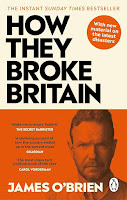 This is a righteously angry account of the past 15 years of politics in the UK, under Conservative (mis)rule. O’Brien ends with the disastrous mini-budget announced on 23 September 2022 by Kwasi Kwarteng, Chancellor the Exchequer to Prime Minister Liz Truss. The book is about the cascade of errors and bad-faith actions that, over more than a decade, got us to that point.
This is a righteously angry account of the past 15 years of politics in the UK, under Conservative (mis)rule. O’Brien ends with the disastrous mini-budget announced on 23 September 2022 by Kwasi Kwarteng, Chancellor the Exchequer to Prime Minister Liz Truss. The book is about the cascade of errors and bad-faith actions that, over more than a decade, got us to that point.It’s divided into chapters covering, in turn, Rupert Murdoch, Paul Dacre, Andrew Neil, Matthew Elliott, Nigel Farage, David Cameron, Jeremy Corbyn, Dominic Cummings, Boris Johnson and Liz Truss (with an afterword in my paperback edition written in February 2024 about Rishi Sunak). It is necessarily wide-ranging to cover the myriad interconnections between politicians, think-tanks and allies in the media, and between politicians in the UK with movements and cabals abroad. It is densely packed with evidence. The result is engrossing (due to the author) and intensely infuriating (due to what he describes).
One example will give the flavour:
“In August 2019, Thiemo Fetzer, a professor in economics at the University of Warwick, went further:
‘I gathered data from all electoral contests that took place in the UK since 2000, and assembled a detailed individual-led panel data set covering almost 40,000 households since 2009. Through these data, I studied to what extent an individual’s or region’s exposure to welfare cuts since 2010 was associated with increased political support for UKIP in the run up to the Brexit referendum in 2016. The analysis suggests that this association was so strong that the 2016 EU referendum would have resulted in a clear victory for Remain (or the referendum might never have happened) had it not been for austerity measures such as extensive cuts to public spending.’ [Quotation from Thiemo Fetzer, ‘Did Austerity in the UK Lead to the Brexit Crisis?’, Harvard Business Review, 23 August 2019]
In other words, David Cameron and George Osborne created the dissatisfaction and distress that would prompt many people to vote for Brexit. Into this space sashayed the deliberate and deceitful demonisation of workers from other EU countries, perpetrated by Nigel Farage and co., and the unkeepable promises about prosperity punted by the likes of Boris Johnson and Jacob Rees-Mogg, drawing on erroneous economic modelling.” (p. 242)
O’Brien is good at making these connections: the way one misguided policy or deliberately cynical action has had far-reaching negative effects. The incidents he describes are usually well known — they were often leading stories on the news — but he shows how they are symptoms of a wider culture of privilege and personal connection. He shows how each headline is an incremental steps towards that mini-budget.
In some ways, I think this book picks up the baton from The Blunders of Our Governments (2013), by Anthony King & Ivor Crewe, but whereas that largely describes a bunch of well-meaning professionals whose fault is unconscious bias, O’Brien digs into something much more pernicious: a protection racket, effectively, to line the pockets of the haves by preying on the have-nots.
But it is also about the fantasies of those involved: their actions, their supporters, driven by beliefs that fly in the face of reality. The perceived threat of immigration or of public spending, the perceived bias of the media if it is not wholly supportive, a whole pack of straw dogs. Worst of all is the lofty disdain when it all goes wrong, the certainty — despite all evidence — that they will yet be vindicated.
Not delusions of grandeur but delusions of the grand.
February 27, 2025
Power of 3 podcast #360: Terror of the Suburbs
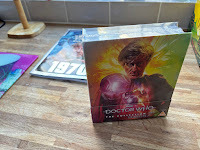 I've just received my copy of the Blu-ray boxset Doctor Who Season 7, comprising the 25 episodes first broadcast in 1970. This saw the debut of the Third Doctor, as played by Jon Pertwee, his companion Dr Liz Shaw (Caroline John) and Doctor Who being made in colour. It also began a run of adventures in which the Doctor is stranded on Earth, without the use of his TARDIS...
I've just received my copy of the Blu-ray boxset Doctor Who Season 7, comprising the 25 episodes first broadcast in 1970. This saw the debut of the Third Doctor, as played by Jon Pertwee, his companion Dr Liz Shaw (Caroline John) and Doctor Who being made in colour. It also began a run of adventures in which the Doctor is stranded on Earth, without the use of his TARDIS...That last element is the subject of the documentary Terror of the Suburbs, included on the new set. It's presented by Matthew Sweet and produced by me and the team at Eklectics. I'll post some more details about it once people have had a chance to watch...
In the meantime, I shared a few not-too-spoilery things with Kenny Smith for episode #360 of his podcast Power of 3. You also get to hear from high wizard Peter Crocker about exactly what was involved in restoring these old episodes.
Doctor Who Magazine's special issue on the 1970 series of Doctor Who is also on sale and includes my article on the cast and crew it shared with the soap opera Crossroads. Earlier this week, I posted a bit more about that and the fact that David Whitaker wrote 32 episodes of Crossroads.
February 24, 2025
David Whitaker wrote 35 episodes of Crossroads
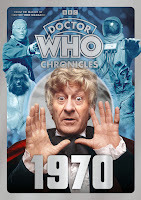 I’ve just received my copy of
Doctor Who Chronicles — 1970
, from the makers of Doctor Who Magazine. It features, on pp. 28-31 “Cross purposes”, my article on the back and forth of personnel between the production teams of Doctor Who and the ATV soap opera Crossroads, me arguing that the 1970 reboot of Doctor Who owes as much to the soap as it does to the oft-cited Quatermass.
I’ve just received my copy of
Doctor Who Chronicles — 1970
, from the makers of Doctor Who Magazine. It features, on pp. 28-31 “Cross purposes”, my article on the back and forth of personnel between the production teams of Doctor Who and the ATV soap opera Crossroads, me arguing that the 1970 reboot of Doctor Who owes as much to the soap as it does to the oft-cited Quatermass. Several writers worked on both Doctor Who and Crossroads at different times, including Barbara Clegg, Terrance Dicks, David Ellis, Paul Erickson, Brian Hayles, Don Houghton, Malcolm Hulke, Peter Ling, Derrick Sherwin and my bae David Whitaker. I trace who did what when, and the direction of travel back and forth between the two series.
But this new article originates in me being wrong. Here is the full story, with a wealth of new information about David Whitaker.
On page 332 of my biography David Whitaker in an Exciting Adventure with Television, I quote a Sunday Times story by ‘Atticus’ (Michael Bateman) from 8 March 1970, criticising actions by David Whitaker ‘who used to write for Crossroads.’ I respond to this: ‘David had written episodes of the soap opera Compact, not Crossroads.’ In fact, I now know David wrote for both.
A number of things led me to the wrong conclusion in my book. First, I had access to various CVs and potted biographies of David from over the years, which tend to emphasise the great variety of film and TV he worked on. None of them mention Crossroads yet they include many things that didn’t make it to the screen or for which he didn't receive on-screen credit.
For example, a report in the Australian TV Week from 18 May 1974, which interviewed David, claimed he’d written ‘a number of episodes of The Saint, The Avengers and Danger Man’. He’d had a meeting about potential work on The Saint and may have pitched an episode of Danger Man… But he doesn't have a credit on any of these shows and there's no evidence that he was ever commissioned to write full scripts for them. It seems that David, not uniquely in the industry, exaggerated a little to bulk out his CV. I thought if he had worked on Crossroads, or even gone for a meeting with the production team, he would have included it on a CV.
I was able to verify that David is not credited as writer on any surviving episodes of Crossroads. When researching at Birmingham Central Library, I leafed through old copies of listings magazine TV Times but the random selection of Crossroads episodes I found did not credit the writer (or director or producer). This was, as we'll see, an oversight on my part.
IMDB, as yet, does not credit David for any episodes of Crossroads but I already knew it was missing many screen credits I could trace from other sources. I ran David's name through The Kaleidoscope British Independent Television Drama Research Guide 1955-2010 edited by Simon Coward, Richard Down and Christopher Perry (2010) and various online archives but his name didn’t come up in relation to Crossroads.
In addition, one of the people I interviewed for my book told me that they didn’t think David wrote for Crossroads as it was a programme they watched and they would have spotted his name. In all, it seemed fair to surmise that ‘Atticus’ in the Sunday Times had muddled things up: David Whitaker worked with writers Hazel Adair and Peter Ling on developing their BBC soap opera Compact and is credited as writer on seven episodes of that; but he didn’t then work on their ATV soap Crossroads.
Then, late last year, Doctor Who Magazine #610 boasted an extended interview with former producer Philip Hinchcliffe, in which writer Benjamin Cook noted that Hinchcliffe had written for Crossroads. In a footnote on page 26, Ben said that “David Whittaker” — two Ts — had also written for the soap.
I ran some online searches to see if I could corroborate this and ended up finding a photograph of the cast and crew of Crossroads (image 12588028vh) that has been added to Shutterstock since I wrote my book. Second from the left in the bottom row is David Whitaker. Which, flipping heck, is pretty conclusive evidence that he worked on the series.
The caption with the photograph tells us who some of the other people are:
“Crossroads: Behind the scenes cast and crew picture circa early 1970s - featuring, including Rollo Gamble (TV Director, 1st R, back row), Jack Barton (TV Director and Producer, 3rd L back row), Tish Hope, as played by Joy Andrews (5th L, middle row), Noele Gordon as Meg Richardson, Ann George, as Amy Turtle, Susan Hanson, as Diane (2nd R middle row), David Whitaker (TV Script Writer - former BBC TV series Doctor Who writer, 2nd L btm row), Reg Watson (Producer, seated centre on chair), and others”
I think Hazel Adair and Peter Ling are in the front row, Ling in glasses and moustache at Reg Watson’s knee. Second left on the back row, stood between Rollo Gamble and Jack Barton, may be fellow director Alan Coleman. (Three of the people in this photograph figured in Russell T Davies' 2023 drama Nolly, namely Noele Gordon played by Helena Bonham Carter, Susan Hanson played by Chloe Harris and director Jack Barton played by Con O'Neill.)
I was especially taken by the sight of Rollo Gamble in the top-right corner, as he played Squire Winstanley in 1971 Doctor Who story The Daemons. It was this that inspired my new article for DWM.
The photograph seems to show cast and crew on the roof of Bradford House, on Bradford Street in Digbeth, which ATV rented for rehearsals. As my friend David Jennings astutely notes, the skyline matches the view in pictures taken in 2007, and the view would have been very different from the original ATV Centre in Aston or the new complex on Broad Street, which opened in 1970. Since Cleo Sylvestre, who joined the cast in an episode first broadcast on 27 January 1970, doesn’t feature among the cast in this photograph, I think it must have been taken in 1969.
Having found this photograph, I got in touch with Benjamin Cook to ask what sources he’d drawn from. He pointed me back towards the Kaleidoscope guide, which lists 24 episodes of Crossroads written by David Whittaker — two Ts — between 22 July 1969 and 27 February 1970. But there were also numerous gaps where no writer was credited at all, leaving the tantalising prospect that Whitaker had written more.
The Kaleidoscope guide lists episodes of Crossroads on the basis of their first transmission on the ATV network (as some other ITV regions showed Crossroads days or even months behind). I double-checked against copies of TV Times for the Midlands region (the one served by ATV) at Birmingham Central Library and found David credited for eight episodes covering that same period, 22 July 1969 to 27 February 1970.
But the reason for the discrepancy swiftly became clear. At the time, Crossroads was broadcast four times a week, Tuesday to Friday, and the listings in TV Times usually credits writer, director and producer only on the Tuesday. The implication is that the same writer and director were assigned blocks of four episodes at a time — a week’s worth. David was therefore credited on eight blocks of four episodes, or 32 in total. It was consistent work, one block per calendar month between July and February. And nothing either side.
The TV Times listings usually include a line of dialogue from the episode in question, instead of precis or recap (which might spoil the plot). This gives some flavour of the drama. What's more, the lines of dialogue seem to be from the opening moments of each episode. That meant I could relatively easily match the listings printed in TV Times with the soundtrack of an otherwise missing episode - part of a cache of 1960s episodes of Crossroads on the Internet Archive - and show it was one written by David.
* UPDATE 12 March 2025. David Jennings has been in touch to add to the total. The TV Times for the week of 27 September 1969 lists Peter Ling as writer of Crossroads on Tuesday, 30 September. But then David is credited for Wednesday, 1 October. There's no writer credit for Thursday or Friday, but the assumption is he oversaw that whole block of episodes bar the first one.
David Whitaker's 32 episodes of Crossroads are as follows, with quotations, cast and crew details as per the ATV region TV Times:
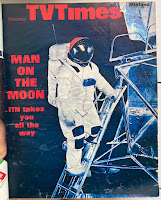 Episode 1116, 6.35 pm, Tuesday, 22 July 1969 (the day after Neil Armstrong and Buzz Aldrin left the surface of the Moon)
Episode 1116, 6.35 pm, Tuesday, 22 July 1969 (the day after Neil Armstrong and Buzz Aldrin left the surface of the Moon)
“Amy: Any more surprises and I’ll jump out of my skin.”
Cast: Noele Gordon (Meg Richardson); David Davenport (Malcolm Ryder); Michael McStay (Steve Mitchell); Pamela Duncan (Mrs Cordelia Fitts); Ann George (Amy Turtle); Joy Andrews (Mrs Hope); William Avenall (Mr Lovejoy); Gillian Betts (Josefina Rafael); Susan Travers (Elena Brandt); Eva Wishaw (Tessa Wyvern); Jane Rossington (Jill Richardson); Ralph Lawton (Sgt Yorke); Peter Boyes (Nick Van Doren); Jack Haig (Archie Gibbs).
WRITER DAVID WHITAKER: DIRECTOR ROLLO GAMBLE PRODUCER REG WATSON
Full listing for this episode in the Anglia-region version of TV Times (because I couldn't get a very legible picture from the bound edition of the Midlands version!):
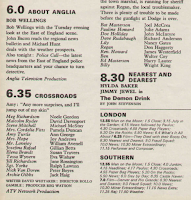
Episode 1117, 6.35 pm, Wednesday 23 July 1969
Jill: “I know. You’re so innocent and misunderstood. But can’t you see how much trouble you’re causing?”
Cast: Noele Gordon (Meg Richardson); David Davenport (Malcolm Ryder); Jane Rossington (Jill Richardson); Eva Wishaw (Tessa Wyvern); Ann George (Amy Turtle); Joy Andrews (Mrs Hope); Susan Travers (Elena Brandt); Pamela Duncan (Mrs Cordelia Fitts); Peter Boyes (Nick Van Doren); Michael McStay (Steve Mitchell); Bay White (Mrs Arden); Gillian Betts (Josefina Rafael); Neville Hughes (Peter Hope); John Bradbury (Musician).
DIRECTOR JACK BARTON
Episode 1118, 6.35 pm, Thursday, 24 July 1969
Malcolm: “Burn the dinner! Chuck it in the dustbin!”
Cast: Noele Gordon (Meg Richardson); David Davenport (Malcolm Ryder); Michael McStay (Steve Mitchell); Eva Wishaw (Tessa Wyvern); Gillian Betts (Josefina Rafael); Ann George (Amy Turtle); Joy Andrews (Mrs Hope); Pamela Duncan (Mrs Cordelia Fitts); Jack Haig (Archie Gibbs); Neville Hughes (Peter Hope); Peter Boyes (Nick Van Doren); Jane Rossington (Jill Richardson); Ralph Lawton (Sgt Yorke).
Episode 1119, 6.35 pm, Friday 25 July 1969
Same quotation and listing given as for Thursday.
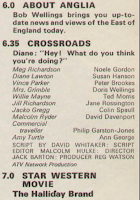 Episode 1132, 6.35 pm Tuesday 19 August 1969
Episode 1132, 6.35 pm Tuesday 19 August 1969Diane: “Hey! What do you think you’re doing?”
Cast: Noele Gordon (Meg Richardson); Susan Hanson (Diane Lawton); Peter Brookes (Vince Parker); Doris Wellings (Mrs Grimble); Ted Morris (Willie Mayne); Jane Rossington (Jill Richardson); Colin Spaull (Jacko Gregg); David Davenport (Malcolm Ryder); Philip Garston-Jones (Commercial traveller); Ann George (Amy Turtle).
SCRIPT BY DAVID WHITAKER: SCRIPT EDITOR MALCOLM HULKE: DIRECTOR JACK BARTON: PRODUCER REG WATON
Episode 1133, 6.35 pm, Wednesday 20 August 1969
Mr Lovejoy: “Am I such a tyrant?”
Cast: Peter Brookes (Vince Parker); Susan Hanson (Diana [sic] Lawton); Doris Wellings (Mrs Grimble); Ted Morris (Willie Mayne); Ralph Lawton (Sgt Yorke); Joy Andrews (Mrs Hope); Ann George (Amy Turtle); Gillian Betts (Josefina Rafael); William Avenell (Mr Lovejoy); Peter Boyes (Nick Van Doren); Philip Garston-Jones (Commercial traveller); Eve Whishaw (Tessa Wyvern). NB no credit for Noele Gordon.
Episode 1134, 6.35pm, Thursday 21 August 1969
Joesfina: “Now, now, Mrs Hope—you’re match-making.”
No cast given.
Episode 1135, 6.35 pm, Friday 22 August 1969
Diane: “Wouldn’t it be better to tell Mrs Richardson about the gambling?”
No cast given.
Episode 1148, 6.35 pm, Tuesday 16 September 1969
Booth: “I have strict rules.”
Cast: Noele Gordon (Meg); Hilary Wontner (Sir Geoffrey); Ann George (Amy Turtle); David Lawton (Mr Booth); Susan Hanson (Diane Lawton); Gillian Betts (Josefina Rafael); Jon Kelly (Frank Adam); Joy Andrews (Mrs Hope); William Avenell (Mr Lovejoy); Paul Large (Paul Tatum); Jane Rossington (Jill).
WRITER DAVID WHITAKER: DIRECTOR ALAN COLEMAN: PRODUCER REG WATSON.
Episode 1149, 6.35 pm, Wednesday 17 September 1969
Amy: “It gives you confidence to have a revolver in the palm of your hand.”
No cast given.
Episode 1150, 6.35 pm, Thursday, 18 September 1969
Meg: “Why didn’t Malcolm confide in me?”
Sir Geoffrey: “I’m offering you a lifeline. You must take it.”
No cast given.
Episode 1151, 6.35pm, Friday 19 September 1969
Meg: “Are you certain he doesn’t need any stitches?”
No cast given. The audio of this episode survives.
(Episode 1156, 6.35 pm, Tuesday 30 September 1969 credited in TV Times to writer Peter Ling)
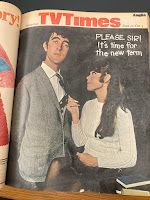 Episode 1157, 6.35 pm, Wednesday 1 October 1969
Episode 1157, 6.35 pm, Wednesday 1 October 1969Nick: “I hope you’re wrong about Mrs Grey.”
Cast: Roger Squires (Harold Brackett); Isabella Rye (Mary-Lou Patterson); Peter Brookes (Vince Parker); Susan Hanson (Diane Lawton); Brian Kent (Dick Jarvis); Gaby Vargas (Vivienne Miller); William Avenell (Mr Lovejoy); Jane Rossington (Jill Richardson); Eva Whishaw (Tessa Wyvern); Neville Hughes (Peter Hope); Peter Boyes (Nick Van Doren); Joy Andrews (Mrs Hope); Ann George (Amy Turtle); Patricia Greene (Mrs Grey)
WRITER DAVID WHITAKER : DIRECTOR JACK BARTON : PRODUCER REG WATSON
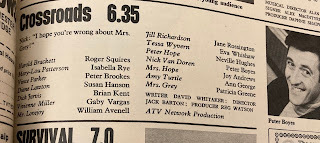
Episode 1158, 6.35 pm, Thursday 2 October 1969
No cast or details given.
Episode 1159, 6.35 pm, Friday 3 October 1969
“He’s dead... He’s dead!”
Cast: Peter Brookes (Vince Parker); Elisabeth Croft (Miss Tatum); Brian Kent (Dick Jarvis); Susan Hanson (Diane Lawton); Joy Andrews (Mrs Hope); Peter Boyes (Nick Van Doren); Eva Wishaw (Tessa Wyvern); William Avenell (Mr Lovejoy); Jane Rossington (Jill Richardson); Isabelle Rye (Mary Lou Patterson); Jack Haig (Archie Gibbs); Ann George (Amy Turtle); Neville Hughes (Peter Hope); Gaby Vargas (Vivienne Miller); Patricia Greene (Mrs Grey)
Episode 1172, 6.35 pm, Tuesday 28 October 1969
Mrs Grey: “That’s why I’m here.”
Malcolm: “Because of me.”
Cast: Noele Gordon (Meg Richardson); David Davenport (Malcolm Ryder); Patricia Greene (Mrs Grey); Susan Hanson (Diane Lawton); Ann George (Amy Turtle); Peter Boyes (Nick Van Doren); Michael Anthony (Col. St Clair); Joy Andrews (Mrs Hope); Jane Rossington (Jill Richardson); Denis Gilmore (Terry Lawton).
SCRIPT DAVID WHITAKER: DIRECTOR ALAN COLEMAN: PRODUCER REG WATSON
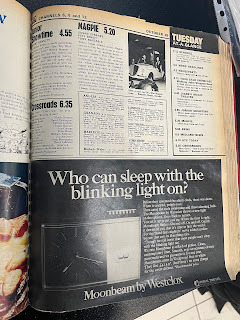
Episode 1173, 6.35pm, Wednesday 29 October 1969
Jill: “Thick quickly, Uncle Dick, because I mean what I say.”
No cast given.
Episode 1174, 6.35pm, Thursday 30 October 1969
Diane: “Why don’t you order champagne?”
Terry: “A beer’s not going to break us is it?”
Cast: Elisabeth Croft (Miss Tatum); Peter Brookes (Vince Parker); John Henderson (Mr Meddows); Joy Andrews (Mrs Hope); Ann George (Amy Turtle); Susan Hanson (Diane Lawton); Beatrice Shaw (Mrs Seymour); Peter Boyes (Nick Van Doren); Jane Rossington (Jill Richardson); Brian Kent (Dick Jarvis); Denis Gilmore (Terry Lawton); Brian Hankins (Derek Maynard); David Davenport (Malcolm Ryder).
Episode 1175, 6.35pm, Friday 31 October 1969
Gypsy: “Shall I read what the cards say for you, Lady?”
Cast: Noele Gordon (Meg Richardson); David Davenport (Malcolm Ryder); Brian Hankins (Derek Maynard); Ann George (Amy Turtle); Peter Boyes (Nick Van Doren); Peter Brookes (Vince Parker); Susan Hanson (Diane Lawton); Patricia Greene (Mrs Grey); Malja Woolf (Gypsy); Beatrice Shaw (Mrs Seymour); Denis Gilmore (Terry Lawton); Joy Andrews (Mrs Hope); John Henderson (Mr Meddows); Elisabeth Croft (Miss Tatum).
Episode 1188, 6.35 pm Tuesday 25 November 1969 (Crossroads now in colour)
No quotation
Cast: Joy Andrews (Mrs Hope); John Gatrell (Commander Boone); Denis Gilmore (Terry Lawton); Sally-Jane Spencer (Caroline Boone); David Davenport (Malcolm Ryder); Peter Boyes (Nick Van Doren); William Avenell (Mr Lovejoy); Elisabeth Croft (Miss Tatum); Peter Brookes (Vince Parker); Eva Wishaw (Tessa Wyvern); David Sherwood (Danny Conroy); Jane Rossington (Jill Richardson).
SCRIPT BY DAVID WHITAKER: DIRECTOR ROLLO GAMBLE: PRODUCER REG WATSON.
Episode 1189, 6.35 pm, Wednesday, 26 November 1969
Terry: “The Commander? He didn’t land me this one?”
Cast: Noele Gordon (Meg Richardson); Eva Whishaw (Tessa Wyvern); Susan Hanson (Diane Lawton); Jane Rossington (Jill Richardson); Ann George (Amy Turtle); Peter Boyes (Nick Van Doren); Gillian Betts (Josefina Rafael); Joy Andrews (Mrs Hope); Denis Gilmore (Terry Lawton); William Avenell (Mr Lovejoy); David Sherwood (Danny Conroy); David Davenport (Malcolm Ryder); Patricia Greene (Mrs Grey); Jack Haig (Archie Gibbs).
WRITER DAVID WHITAKER: DIRECTOR ROLLO GAMBLE: PRODUCER REG WATSON
Episode 1190, 6.35 pm, Thursday, 27 November 1969
Archie: “Do you want to make £100?”
Cast: Noele Gordon (Meg Richardson); Susan Hanson (Diane Lawton); Jack Haig (Archie Gibbs); David Sherwood (Danny Conroy); Eva Whishaw (Tessa Wyvern); Peter Boyes (Nick Van Doren); David Davenport (Malcolm Ryder); Peter Brookes (Vince Parker); Joy Andrews (Mrs Hope); Brian Hankins (Derek Maynard); Jean Aubrey (Kathy Knight); Jane Rossington (Jill Richardson); Neville Hughes (Peter Hope); William Avenell (Mr Lovejoy); Patricia Greene (Mrs Grey).
Episode 1191, 6.35 pm, Friday, 28 November 1969
Amy: “Oh yes… here, he’s not leading you astray is he?”
Cast: Noele Gordon (Meg Richardson); Peter Boyes (Nick Van Doren); William Avenell (Mr Lovejoy); Susan Hanson (Diane Lawton); Jack Haig (Archie Gibbs); Ann George (Amy Turtle); Joy Andrews (Mrs Hope); Gillian Betts (Josefina Rafael); David Davenport (Malcolm Ryder); Elisabeth Croft (Miss Tatum); Peter Brookes (Vince Parker); Neville Hughes (Peter Hope); Brian Hankins (Derek Maynard); Jean Aubrey (Kathy Knight); Jane Rossington (Jill Richardson); Eva Whishaw (Tessa Wyvern); Patricia Greene (Mrs Grey).
Episode 1209, 6.35 pm, Tuesday, 30 December 1969
Mr Lovejoy: “Your way is not the only way.”
Mr Booth: “Your way is certainly not the right way.”
Cast: Noele Gordon (Meg Richardson); Jacqueline Stanbury (Joanne Peterson); Roger Tonge (Sandy Richardson); David Lawton (Mr Booth); William Avenell (Mr Lovejoy); Susan Hanson (Diane Lawton); David Sherwood (Danny Conroy); Peter Boyes (Nick Van Doren); Joy Andrews (Mrs Hope); Neville Hughes (Peter Hope); Nadine Hanwell (Marilyn Hope); Nicola Davies (Angela Davy); Beatrice Kane (Miss Davey).
WRITER DAVID WHITAKER: DIRECTOR ALAN COLEMAN: PRODUCER REG WATSON
Episode 1210, 6.35 pm, Wednesday, 31 December 1969
Eve: “Do you remember I told you Michael was out of the country?”
Mrs Hope: “Yes.”
Eve: “Diane met him at the El Dorado.”
Cast: Roger Tonge (Sandy Richardson); Jacqueline Stanbury (Joanne Peterson); William Avenell (Mr Lovejoy); Susan Hanson (Diane Lawton); Nadine Hanwell (Marilyn Hope); Neville Hughes (Peter Hope); Joy Andrews (Mrs Hope); Toni Sinclair (Eve Baker); David Sherwood (Danny Conroy); Ann George (Amy Turtle); Peter Boyes (Nick Van Doren); Jane Rossington (Jill Richardson); Nicola Davies (Angela Davy).
Episode 1211, 6.35 pm, Thursday, 1 January 1970
Mr Booth: “Mr Lovejoy’s quite an elderly gentleman, isn’t he?”
Cast: Noele Gordon (Meg Richardson); Claire Davenport (Miss Worbeck); Jacqueline Stanbury (Joanne Peterson); David Lawton (Mr Booth); Peter Boyes (Nick Van Doren); William Avenell (Mr Lovejoy); Roger Tonge (Sandy Richardson); Susan Hanson (Diane Lawton); Toni Sinclair (Eve Baker); Joy Andrews (Mrs Hope); Neville Hughes (Peter Hope); Nadine Hanwell (Marilyn Hope); Nicola Davies (Angela Davy); Peter Brookes (Vince Parker).
Episode 1212, 6.35 pm, Friday 2 January 1970
Michael: “Take a look in the mirror sweetheart, and give yourself a shock.”
Cast: Noele Gordon (Meg Richardson); Peter Brookes (Vince Parker); Joy Andrews (Mrs Hope); Toni Sinclair (Eve Baker); Paul Greaves (Michael Phillips); Roger Tonge (Sandy Richardson); Jacqueline Stanbury (Joanne Peterson); Claire Davenport (Miss Worbeck); Nadine Hanwell (Marilyn Hope); Neville Hughes (Peter Hope).
Episode 1225, 6.35 pm, Tuesday 27 January 1970
Eve: “How much will you pay me to tell my story to your paper?”
Cast: Toni Sinclair (Eve Baker); Joy Andrews (Mrs Hope); Michael Mundell (Marcus Allison); Susan Hanson (Diane Lawton); Nadine Hanwell (Marilyn Hope); Neville Hughes (Peter Hope); Peter Brookes (Vince Parker); Peter Boyes (Nick Van Doren); Ann George (Amy Turtle); Doreen Keogh (Mrs Candour); Cleo Sylvestre (Melanie Harper).
WRITER DAVID WHITAKER: DIRECTOR ROLLO GAMBLE: PRODUCER REG WATSON.
This was a notable episode, featuring the introduction of new regular character Melanie Harper, played by Cleo Sylvestre (who had also had a role in David’s 1965 Doctor Who story The Crusade). Sylvestre later recalled:
“Enoch Powell had been making those terrible ‘Rivers of Blood’ speeches, which resulted in a lot of racial tension up and down the country, especially in cities like Birmingham. Reg [Watson, producer of Crossroads] must have picked up on this, and decided to create one of the first regular black characters in a British soap… Melanie Harper was Meg’s adopted daughter who, until then, had never been mentioned. Melanie arrived from France, where she had been studying, and viewers just accepted her. It was great. It was wonderful.
“At the very end of an episode, I walked into the motel with a suitcase and rung the reception desk bell. The receptionist came out and I said 'Can I speak to Mrs Richardson, please?’ and she said ‘Yes. Who shall I say is asking for her?’ I replied, ‘Tell her it’s her daughter.’ And then the music came up. What a cliffhanger! This was the first time Meg’s other daughter had been mentioned.” - Cleo Sylvestre, interviewed by Stephen Bourne as part of ‘Soap Queens’ at the NFT, 2001
Episode 1226, 6.35 pm, Wednesday, 28 January 1970
Peter: “The Bishop wants to see me as soon as possible.”
Cast: Noele Gordon (Meg Richardson); Cleo Sylvestre (Melanie Harper); Peter Brookes (Vince Parker); Susan Hanson (Diane Lawton); Ann George (Amy Turtle); Toni Sinclair (Eve Baker); Doreen Keogh (Mrs Candour); David Sherwood (Danny Conroy); Joy Andrews (Mrs Hope); Michael Mundell (Marcus Allison); Neville Hughes (Peter Hope); Nadine Hanwell (Marilyn Hope).
Episode 1227, 6.35 pm Thursday, 29 January 1970
Meg: “I’ve had some news about Malcolm, Mrs Grey—you’re the only one I can talk to.”
Cast: Noele Gordon (Meg Richardson); Neville Hughes (Peter Hope); Nadine Hanwell (Marilyn Hope); Joy Andrews (Mrs Hope); Toni Sinclair (Eve Baker); Susan Hanson (Diane Lawton); Peter Brookes (Vince Parker); Peter Boyes (Nick Van Doren); Doreen Keogh (Mrs Candour); Cleo Sylvestre (Melanie Harper); Ann George (Amy Turtle); David Sherwood (Danny Conroy); William Sherwood (The Bishop); Patricia Greene (Mrs Grey).
Episode 1228, 6.35 pm, Friday, 30 January 1970
Mrs Hope: “Angela, either you do come, or I’ll say what I have to say to your aunt… and to the police.”
Cast: Noele Gordon (Meg Richardson); Toni Sinclair (Eve Baker); Joy Andrews (Mrs Hope); Peter Boyes (Nick Van Doren); ; Cleo Sylvestre (Melanie Harper); David Sherwood (Danny Conroy); Michael Mundell (Marcus Allison); Nicola Davies (Angela Davy); Patricia Greene (Mrs Grey); Doreen Keogh (Mrs Candour); Neville Hughes (Peter Hope); Nadine Hanwell (Marilyn Hope); Beatrice Kane (Miss Davy).
Episode 1241, 6.35 pm Tuesday, 24 February 1970
Eve: “He’s still critically ill. I could have helped him you know. He begged me—and I refused.”
Cast: Noele Gordon (Meg Richardson); Kevin Frazer (Rex Drayton); Susan Hanson (Diane Lawton); Cleo Sylvestre (Melanie Harper); Peter Boyes (Nick Van Doren); Jon Kelley (Frank Adam); Toni Sinclair (Eve Baker).
WRITER DAVID WHITAKER: DIRECTOR JACK BARTON: PRODUCER REG WATSON
Episode 1242, 6.35 pm, Wednesday, 25 February 1970
Meg: “There’s only one way to get some sanity into this motel and that is to set fire to everyone and start all over again.”
Cast: Noele Gordon (Meg Richardson); Susan Hanson (Diane Lawton); Cleo Sylvestre (Melanie Harper); Joy Andrews (Mrs Hope); David Sherwood (Danny Conroy); William Avenell (Mr Lovejoy); Jon Kelley (Frank Adam); Peter Boyes (Nick Van Doren); Toni Sinclair (Eve Baker); David Lawton (Mr Booth); Kevin Frazer (Rex Drayton).
Episode 1243, 6.35 pm, Thursday 26 February 1970
Nurse: “You really shouldn’t have come back, Miss Baker. I did say we’d get in touch with you if there was any change.”
Cast: Joy Andrews (Mrs Hope); Toni Sinclair (Eve Baker); Peter Boyes (Nick Van Doren); William Avenell (Mr Lovejoy); David Sherwood (Danny Conroy); Ann George (Amy Turtle); Lee Clark (Delivery boy); Kevin Frazer (Rex Drayton); Cleo Sylvestre (Melanie Harper); Susan Hanson (Diane Lawton); Sarah Child (Nurse).
Episode 1244, 6.35 pm, Friday 27 February 1970
Melanie: “I don’t know what you’re talking about.”
Diane: “When I woke up in the middle of the night you were missing.”
Cast: Cleo Sylvestre (Melanie Harper); Susan Hanson (Diane Lawton); Peter Brookes (Vince Parker); David Sherwood (Danny Conroy); Jon Kelley (Frank Adam); Toni Sinclair (Eve Baker); Joy Andrews (Mrs Hope); Ann George (Amy Turtle); David Lawton (Mr Booth); Deidre Costello (Rita Mayne); Peter Boyes (Nick Van Doren).When Atticus wrote the Sunday Times piece published on 8 March, David Whitaker had stopped working for Crossroads only very recently. We don't know the circumstances under which he left the programme but around this time other people who employed David received poison-pen letters about him. Did such letters reach ATV and hasten his departure? If so, is there something knowing, even crowing, about the Sunday Times saying that he “used to write for Crossroads”?
Whatever the case, David Whitaker left just before the arrival of a new writer on Crossroads. Philip Hinchcliffe's first episode aired on ATV on 21 April 1970.
David Whitaker wrote 32 episodes of Crossroads
 I’ve just received my copy of
Doctor Who Chronicles — 1970
, from the makers of Doctor Who Magazine. It features, on pp. 28-31 “Cross purposes”, my article on the back and forth of personnel between the production teams of Doctor Who and the ATV soap opera Crossroads, me arguing that the 1970 reboot of Doctor Who owes as much to the soap as it does to the oft-cited Quatermass.
I’ve just received my copy of
Doctor Who Chronicles — 1970
, from the makers of Doctor Who Magazine. It features, on pp. 28-31 “Cross purposes”, my article on the back and forth of personnel between the production teams of Doctor Who and the ATV soap opera Crossroads, me arguing that the 1970 reboot of Doctor Who owes as much to the soap as it does to the oft-cited Quatermass. Several writers worked on both Doctor Who and Crossroads at different times, including Barbara Clegg, Terrance Dicks, David Ellis, Paul Erickson, Brian Hayles, Don Houghton, Malcolm Hulke, Peter Ling, Derrick Sherwin and my bae David Whitaker. I trace who did what when, and the direction of travel back and forth between the two series.
But this new article originates in me being wrong. Here is the full story, with a wealth of new information about David Whitaker.
On page 332 of my biography David Whitaker in an Exciting Adventure with Television, I quote a Sunday Times story by ‘Atticus’ (Michael Bateman) from 8 March 1970, criticising actions by David Whitaker ‘who used to write for Crossroads.’ I respond to this: ‘David had written episodes of the soap opera Compact, not Crossroads.’ In fact, I now know David wrote for both.
A number of things led me to the wrong conclusion in my book. First, I had access to various CVs and potted biographies of David from over the years, which tend to emphasise the great variety of film and TV he worked on. None of them mention Crossroads yet they include many things that didn’t make it to the screen or for which he didn't receive on-screen credit.
For example, a report in the Australian TV Week from 18 May 1974, which interviewed David, claimed he’d written ‘a number of episodes of The Saint, The Avengers and Danger Man’. He’d had a meeting about potential work on The Saint and may have pitched an episode of Danger Man… But he doesn't have a credit on any of these shows and there's no evidence that he was ever commissioned to write full scripts for them. It seems that David, not uniquely in the industry, exaggerated a little to bulk out his CV. I thought if he had worked on Crossroads, or even gone for a meeting with the production team, he would have included it on a CV.
I was able to verify that David is not credited as writer on any surviving episodes of Crossroads. When researching at Birmingham Central Library, I leafed through old copies of listings magazine TV Times but the random selection of Crossroads episodes I found did not credit the writer (or director or producer). This was, as we'll see, an oversight on my part.
IMDB, as yet, does not credit David for any episodes of Crossroads but I already knew it was missing many screen credits I could trace from other sources. I ran David's name through The Kaleidoscope British Independent Television Drama Research Guide 1955-2010 edited by Simon Coward, Richard Down and Christopher Perry (2010) and various online archives but his name didn’t come up in relation to Crossroads.
In addition, one of the people I interviewed for my book told me that they didn’t think David wrote for Crossroads as it was a programme they watched and they would have spotted his name. In all, it seemed fair to surmise that ‘Atticus’ in the Sunday Times had muddled things up: David Whitaker worked with writers Hazel Adair and Peter Ling on developing their BBC soap opera Compact and is credited as writer on seven episodes of that; but he didn’t then work on their ATV soap Crossroads.
Then, late last year, Doctor Who Magazine #610 boasted an extended interview with former producer Philip Hinchcliffe, in which writer Benjamin Cook noted that Hinchcliffe had written for Crossroads. In a footnote on page 26, Ben said that “David Whittaker” — two Ts — had also written for the soap.
I ran some online searches to see if I could corroborate this and ended up finding a photograph of the cast and crew of Crossroads (image 12588028vh) that has been added to Shutterstock since I wrote my book. Second from the left in the bottom row is David Whitaker. Which, flipping heck, is pretty conclusive evidence that he worked on the series.
The caption with the photograph tells us who some of the other people are:
“Crossroads: Behind the scenes cast and crew picture circa early 1970s - featuring, including Rollo Gamble (TV Director, 1st R, back row), Jack Barton (TV Director and Producer, 3rd L back row), Tish Hope, as played by Joy Andrews (5th L, middle row), Noele Gordon as Meg Richardson, Ann George, as Amy Turtle, Susan Hanson, as Diane (2nd R middle row), David Whitaker (TV Script Writer - former BBC TV series Doctor Who writer, 2nd L btm row), Reg Watson (Producer, seated centre on chair), and others”
I think Hazel Adair and Peter Ling are in the front row, Ling in glasses and moustache at Reg Watson’s knee. Second left on the back row, stood between Rollo Gamble and Jack Barton, may be fellow director Alan Coleman. (Three of the people in this photograph figured in Russell T Davies' 2023 drama Nolly, namely Noele Gordon played by Helena Bonham Carter, Susan Hanson played by Chloe Harris and director Jack Barton played by Con O'Neill.)
I was especially taken by the sight of Rollo Gamble in the top-right corner, as he played Squire Winstanley in 1971 Doctor Who story The Daemons. It was this that inspired my new article for DWM.
The photograph seems to show cast and crew on the roof of Bradford House, on Bradford Street in Digbeth, which ATV rented for rehearsals. As my friend David Jennings astutely notes, the skyline matches the view in pictures taken in 2007, and the view would have been very different from the original ATV Centre in Aston or the new complex on Broad Street, which opened in 1970. Since Cleo Sylvestre, who joined the cast in an episode first broadcast on 27 January 1970, doesn’t feature among the cast in this photograph, I think it must have been taken in 1969.
Having found this photograph, I got in touch with Benjamin Cook to ask what sources he’d drawn from. He pointed me back towards the Kaleidoscope guide, which lists 24 episodes of Crossroads written by David Whittaker — two Ts — between 22 July 1969 and 27 February 1970. But there were also numerous gaps where no writer was credited at all, leaving the tantalising prospect that Whitaker had written more.
The Kaleidoscope guide lists episodes of Crossroads on the basis of their first transmission on the ATV network (as some other ITV regions showed Crossroads days or even months behind). I double-checked against copies of TV Times for the ATV region at Birmingham Central Library and found David credited for eight episodes covering that same period, 22 July 1969 to 27 February 1970.
But the reason for the discrepancy swiftly became clear. At the time, Crossroads was broadcast four times a week, Tuesday to Friday, and the listings in TV Times usually credits writer, director and producer only on the Tuesday. The implication is that the same writer and director were assigned blocks of four episodes at a time — a week’s worth. David was therefore credited on eight blocks of four episodes, or 32 in total. It was consistent work, one block per calendar month between July and February. And nothing either side.
The TV Times listings usually include a line of dialogue from the episode in question, instead of precis or recap (which might spoil the plot). This gives some flavour of the drama. What's more, the lines of dialogue seem to be from the opening moments of each episode. That meant I could relatively easily match the listings printed in TV Times with the soundtrack of an otherwise missing episode - part of a cache of 1960s episodes of Crossroads on the Internet Archive - and show it was one written by David.
David Whitaker's 32 episodes of Crossroads are as follows, with quotations, cast and crew details as per the ATV region TV Times:
 Episode 1116, 6.35 pm, Tuesday, 22 July 1969 (the day after Neil Armstrong and Buzz Aldrin left the surface of the Moon)
Episode 1116, 6.35 pm, Tuesday, 22 July 1969 (the day after Neil Armstrong and Buzz Aldrin left the surface of the Moon)
“Amy: Any more surprises and I’ll jump out of my skin.”
Cast: Noele Gordon (Meg Richardson); David Davenport (Malcolm Ryder); Michael McStay (Steve Mitchell); Pamela Duncan (Mrs Cordelia Fitts); Ann George (Amy Turtle); Joy Andrews (Mrs Hope); William Avenall (Mr Lovejoy); Gillian Betts (Josefina Rafael); Susan Travers (Elena Brandt); Eva Wishaw (Tessa Wyvern); Jane Rossington (Jill Richardson); Ralph Lawton (Sgt Yorke); Peter Boyes (Nick Van Doren); Jack Haig (Archie Gibbs).
WRITER DAVID WHITAKER: DIRECTOR ROLLO GAMBLE PRODUCER REG WATSON

Episode 1117, 6.35 pm, Wednesday 23 July 1969
Jill: “I know. You’re so innocent and misunderstood. But can’t you see how much trouble you’re causing?”
Cast: Noele Gordon (Meg Richardson); David Davenport (Malcolm Ryder); Jane Rossington (Jill Richardson); Eva Wishaw (Tessa Wyvern); Ann George (Amy Turtle); Joy Andrews (Mrs Hope); Susan Travers (Elena Brandt); Pamela Duncan (Mrs Cordelia Fitts); Peter Boyes (Nick Van Doren); Michael McStay (Steve Mitchell); Bay White (Mrs Arden); Gillian Betts (Josefina Rafael); Neville Hughes (Peter Hope); John Bradbury (Musician).
DIRECTOR JACK BARTON
Episode 1118, 6.35 pm, Thursday, 24 July 1969
Malcolm: “Burn the dinner! Chuck it in the dustbin!”
Cast: Noele Gordon (Meg Richardson); David Davenport (Malcolm Ryder); Michael McStay (Steve Mitchell); Eva Wishaw (Tessa Wyvern); Gillian Betts (Josefina Rafael); Ann George (Amy Turtle); Joy Andrews (Mrs Hope); Pamela Duncan (Mrs Cordelia Fitts); Jack Haig (Archie Gibbs); Neville Hughes (Peter Hope); Peter Boyes (Nick Van Doren); Jane Rossington (Jill Richardson); Ralph Lawton (Sgt Yorke).
Episode 1119, 6.35 pm, Friday 25 July 1969
Same quotation and listing given as for Thursday.
 Episode 1132, 6.35 pm Tuesday 19 August 1969
Episode 1132, 6.35 pm Tuesday 19 August 1969Diane: “Hey! What do you think you’re doing?”
Cast: Noele Gordon (Meg Richardson); Susan Hanson (Diane Lawton); Peter Brookes (Vince Parker); Doris Wellings (Mrs Grimble); Ted Morris (Willie Mayne); Jane Rossington (Jill Richardson); Colin Spaull (Jacko Gregg); David Davenport (Malcolm Ryder); Philip Garston-Jones (Commercial traveller); Ann George (Amy Turtle).
SCRIPT BY DAVID WHITAKER: SCRIPT EDITOR MALCOLM HULKE: DIRECTOR JACK BARTON: PRODUCER REG WATON
Episode 1133, 6.35 pm, Wednesday 20 August 1969
Mr Lovejoy: “Am I such a tyrant?”
Cast: Peter Brookes (Vince Parker); Susan Hanson (Diana [sic] Lawton); Doris Wellings (Mrs Grimble); Ted Morris (Willie Mayne); Ralph Lawton (Sgt Yorke); Joy Andrews (Mrs Hope); Ann George (Amy Turtle); Gillian Betts (Josefina Rafael); William Avenell (Mr Lovejoy); Peter Boyes (Nick Van Doren); Philip Garston-Jones (Commercial traveller); Eve Whishaw (Tessa Wyvern). NB no credit for Noele Gordon.
Episode 1134, 6.35pm, Thursday 21 August 1969
Joesfina: “Now, now, Mrs Hope—you’re match-making.”
No cast given.
Episode 1135, 6.35 pm, Friday 22 August 1969
Diane: “Wouldn’t it be better to tell Mrs Richardson about the gambling?”
No cast given.
Episode 1148, 6.35 pm, Tuesday 16 September 1969
Booth: “I have strict rules.”
Cast: Noele Gordon (Meg); Hilary Wontner (Sir Geoffrey); Ann George (Amy Turtle); David Lawton (Mr Booth); Susan Hanson (Diane Lawton); Gillian Betts (Josefina Rafael); Jon Kelly (Frank Adam); Joy Andrews (Mrs Hope); William Avenell (Mr Lovejoy); Paul Large (Paul Tatum); Jane Rossington (Jill).
WRITER DAVID WHITAKER: DIRECTOR ALAN COLEMAN: PRODUCER REG WATSON.
Episode 1149, 6.35 pm, Wednesday 17 September 1969
Amy: “It gives you confidence to have a revolver in the palm of your hand.”
No cast given.
Episode 1150, 6.35 pm, Thursday, 18 September 1969
Meg: “Why didn’t Malcolm confide in me?”
Sir Geoffrey: “I’m offering you a lifeline. You must take it.”
No cast given.
Episode 1151, 6.35pm, Friday 19 September 1969
Meg: “Are you certain he doesn’t need any stitches?”
No cast given. The audio of this episode survives.
Episode 1172, 6.35 pm, Tuesday 28 October 1969
Mrs Grey: “That’s why I’m here.”
Malcolm: “Because of me.”
Cast: Noele Gordon (Meg Richardson); David Davenport (Malcolm Ryder); Patricia Greene (Mrs Grey); Susan Hanson (Diane Lawton); Ann George (Amy Turtle); Peter Boyes (Nick Van Doren); Michael Anthony (Col. St Clair); Joy Andrews (Mrs Hope); Jane Rossington (Jill Richardson); Denis Gilmore (Terry Lawton).
SCRIPT DAVID WHITAKER: DIRECTOR ALAN COLEMAN: PRODUCER REG WATSON

Episode 1173, 6.35pm, Wednesday 29 October 1969
Jill: “Thick quickly, Uncle Dick, because I mean what I say.”
No cast given.
Episode 1174, 6.35pm, Thursday 30 October 1969
Diane: “Why don’t you order champagne?”
Terry: “A beer’s not going to break us is it?”
Cast: Elisabeth Croft (Miss Tatum); Peter Brookes (Vince Parker); John Henderson (Mr Meddows); Joy Andrews (Mrs Hope); Ann George (Amy Turtle); Susan Hanson (Diane Lawton); Beatrice Shaw (Mrs Seymour); Peter Boyes (Nick Van Doren); Jane Rossington (Jill Richardson); Brian Kent (Dick Jarvis); Denis Gilmore (Terry Lawton); Brian Hankins (Derek Maynard); David Davenport (Malcolm Ryder).
Episode 1175, 6.35pm, Friday 31 October 1969
Gypsy: “Shall I read what the cards say for you, Lady?”
Cast: Noele Gordon (Meg Richardson); David Davenport (Malcolm Ryder); Brian Hankins (Derek Maynard); Ann George (Amy Turtle); Peter Boyes (Nick Van Doren); Peter Brookes (Vince Parker); Susan Hanson (Diane Lawton); Patricia Greene (Mrs Grey); Malja Woolf (Gypsy); Beatrice Shaw (Mrs Seymour); Denis Gilmore (Terry Lawton); Joy Andrews (Mrs Hope); John Henderson (Mr Meddows); Elisabeth Croft (Miss Tatum).
Episode 1188, 6.35 pm Tuesday 25 November 1969 (Crossroads now in colour)
No quotation
Cast: Joy Andrews (Mrs Hope); John Gatrell (Commander Boone); Denis Gilmore (Terry Lawton); Sally-Jane Spencer (Caroline Boone); David Davenport (Malcolm Ryder); Peter Boyes (Nick Van Doren); William Avenell (Mr Lovejoy); Elisabeth Croft (Miss Tatum); Peter Brookes (Vince Parker); Eva Wishaw (Tessa Wyvern); David Sherwood (Danny Conroy); Jane Rossington (Jill Richardson).
SCRIPT BY DAVID WHITAKER: DIRECTOR ROLLO GAMBLE: PRODUCER REG WATSON.
Episode 1189, 6.35 pm, Wednesday, 26 November 1969
Terry: “The Commander? He didn’t land me this one?”
Cast: Noele Gordon (Meg Richardson); Eva Whishaw (Tessa Wyvern); Susan Hanson (Diane Lawton); Jane Rossington (Jill Richardson); Ann George (Amy Turtle); Peter Boyes (Nick Van Doren); Gillian Betts (Josefina Rafael); Joy Andrews (Mrs Hope); Denis Gilmore (Terry Lawton); William Avenell (Mr Lovejoy); David Sherwood (Danny Conroy); David Davenport (Malcolm Ryder); Patricia Greene (Mrs Grey); Jack Haig (Archie Gibbs).
WRITER DAVID WHITAKER: DIRECTOR ROLLO GAMBLE: PRODUCER REG WATSON
Episode 1190, 6.35 pm, Thursday, 27 November 1969
Archie: “Do you want to make £100?”
Cast: Noele Gordon (Meg Richardson); Susan Hanson (Diane Lawton); Jack Haig (Archie Gibbs); David Sherwood (Danny Conroy); Eva Whishaw (Tessa Wyvern); Peter Boyes (Nick Van Doren); David Davenport (Malcolm Ryder); Peter Brookes (Vince Parker); Joy Andrews (Mrs Hope); Brian Hankins (Derek Maynard); Jean Aubrey (Kathy Knight); Jane Rossington (Jill Richardson); Neville Hughes (Peter Hope); William Avenell (Mr Lovejoy); Patricia Greene (Mrs Grey).
Episode 1191, 6.35 pm, Friday, 28 November 1969
Amy: “Oh yes… here, he’s not leading you astray is he?”
Cast: Noele Gordon (Meg Richardson); Peter Boyes (Nick Van Doren); William Avenell (Mr Lovejoy); Susan Hanson (Diane Lawton); Jack Haig (Archie Gibbs); Ann George (Amy Turtle); Joy Andrews (Mrs Hope); Gillian Betts (Josefina Rafael); David Davenport (Malcolm Ryder); Elisabeth Croft (Miss Tatum); Peter Brookes (Vince Parker); Neville Hughes (Peter Hope); Brian Hankins (Derek Maynard); Jean Aubrey (Kathy Knight); Jane Rossington (Jill Richardson); Eva Whishaw (Tessa Wyvern); Patricia Greene (Mrs Grey).
Episode 1209, 6.35 pm, Tuesday, 30 December 1969
Mr Lovejoy: “Your way is not the only way.”
Mr Booth: “Your way is certainly not the right way.”
Cast: Noele Gordon (Meg Richardson); Jacqueline Stanbury (Joanne Peterson); Roger Tonge (Sandy Richardson); David Lawton (Mr Booth); William Avenell (Mr Lovejoy); Susan Hanson (Diane Lawton); David Sherwood (Danny Conroy); Peter Boyes (Nick Van Doren); Joy Andrews (Mrs Hope); Neville Hughes (Peter Hope); Nadine Hanwell (Marilyn Hope); Nicola Davies (Angela Davy); Beatrice Kane (Miss Davey).
WRITER DAVID WHITAKER: DIRECTOR ALAN COLEMAN: PRODUCER REG WATSON
Episode 1210, 6.35 pm, Wednesday, 31 December 1969
Eve: “Do you remember I told you Michael was out of the country?”
Mrs Hope: “Yes.”
Eve: “Diane met him at the El Dorado.”
Cast: Roger Tonge (Sandy Richardson); Jacqueline Stanbury (Joanne Peterson); William Avenell (Mr Lovejoy); Susan Hanson (Diane Lawton); Nadine Hanwell (Marilyn Hope); Neville Hughes (Peter Hope); Joy Andrews (Mrs Hope); Toni Sinclair (Eve Baker); David Sherwood (Danny Conroy); Ann George (Amy Turtle); Peter Boyes (Nick Van Doren); Jane Rossington (Jill Richardson); Nicola Davies (Angela Davy).
Episode 1211, 6.35 pm, Thursday, 1 January 1970
Mr Booth: “Mr Lovejoy’s quite an elderly gentleman, isn’t he?”
Cast: Noele Gordon (Meg Richardson); Claire Davenport (Miss Worbeck); Jacqueline Stanbury (Joanne Peterson); David Lawton (Mr Booth); Peter Boyes (Nick Van Doren); William Avenell (Mr Lovejoy); Roger Tonge (Sandy Richardson); Susan Hanson (Diane Lawton); Toni Sinclair (Eve Baker); Joy Andrews (Mrs Hope); Neville Hughes (Peter Hope); Nadine Hanwell (Marilyn Hope); Nicola Davies (Angela Davy); Peter Brookes (Vince Parker).
Episode 1212, 6.35 pm, Friday 2 January 1970
Michael: “Take a look in the mirror sweetheart, and give yourself a shock.”
Cast: Noele Gordon (Meg Richardson); Peter Brookes (Vince Parker); Joy Andrews (Mrs Hope); Toni Sinclair (Eve Baker); Paul Greaves (Michael Phillips); Roger Tonge (Sandy Richardson); Jacqueline Stanbury (Joanne Peterson); Claire Davenport (Miss Worbeck); Nadine Hanwell (Marilyn Hope); Neville Hughes (Peter Hope).
Episode 1225, 6.35 pm, Tuesday 27 January 1970
Eve: “How much will you pay me to tell my story to your paper?”
Cast: Toni Sinclair (Eve Baker); Joy Andrews (Mrs Hope); Michael Mundell (Marcus Allison); Susan Hanson (Diane Lawton); Nadine Hanwell (Marilyn Hope); Neville Hughes (Peter Hope); Peter Brookes (Vince Parker); Peter Boyes (Nick Van Doren); Ann George (Amy Turtle); Doreen Keogh (Mrs Candour); Cleo Sylvestre (Melanie Harper).
WRITER DAVID WHITAKER: DIRECTOR ROLLO GAMBLE: PRODUCER REG WATSON.
This was a notable episode, featuring the introduction of new regular character Melanie Harper, played by Cleo Sylvestre (who had also had a role in David’s 1965 Doctor Who story The Crusade). Sylvestre later recalled:
“Enoch Powell had been making those terrible ‘Rivers of Blood’ speeches, which resulted in a lot of racial tension up and down the country, especially in cities like Birmingham. Reg [Watson, producer of Crossroads] must have picked up on this, and decided to create one of the first regular black characters in a British soap… Melanie Harper was Meg’s adopted daughter who, until then, had never been mentioned. Melanie arrived from France, where she had been studying, and viewers just accepted her. It was great. It was wonderful.
“At the very end of an episode, I walked into the motel with a suitcase and rung the reception desk bell. The receptionist came out and I said 'Can I speak to Mrs Richardson, please?’ and she said ‘Yes. Who shall I say is asking for her?’ I replied, ‘Tell her it’s her daughter.’ And then the music came up. What a cliffhanger! This was the first time Meg’s other daughter had been mentioned.” - Cleo Sylvestre, interviewed by Stephen Bourne as part of ‘Soap Queens’ at the NFT, 2001
Episode 1226, 6.35 pm, Wednesday, 28 January 1970
Peter: “The Bishop wants to see me as soon as possible.”
Cast: Noele Gordon (Meg Richardson); Cleo Sylvestre (Melanie Harper); Peter Brookes (Vince Parker); Susan Hanson (Diane Lawton); Ann George (Amy Turtle); Toni Sinclair (Eve Baker); Doreen Keogh (Mrs Candour); David Sherwood (Danny Conroy); Joy Andrews (Mrs Hope); Michael Mundell (Marcus Allison); Neville Hughes (Peter Hope); Nadine Hanwell (Marilyn Hope).
Episode 1227, 6.35 pm Thursday, 29 January 1970
Meg: “I’ve had some news about Malcolm, Mrs Grey—you’re the only one I can talk to.”
Cast: Noele Gordon (Meg Richardson); Neville Hughes (Peter Hope); Nadine Hanwell (Marilyn Hope); Joy Andrews (Mrs Hope); Toni Sinclair (Eve Baker); Susan Hanson (Diane Lawton); Peter Brookes (Vince Parker); Peter Boyes (Nick Van Doren); Doreen Keogh (Mrs Candour); Cleo Sylvestre (Melanie Harper); Ann George (Amy Turtle); David Sherwood (Danny Conroy); William Sherwood (The Bishop); Patricia Greene (Mrs Grey).
Episode 1228, 6.35 pm, Friday, 30 January 1970
Mrs Hope: “Angela, either you do come, or I’ll say what I have to say to your aunt… and to the police.”
Cast: Noele Gordon (Meg Richardson); Toni Sinclair (Eve Baker); Joy Andrews (Mrs Hope); Peter Boyes (Nick Van Doren); ; Cleo Sylvestre (Melanie Harper); David Sherwood (Danny Conroy); Michael Mundell (Marcus Allison); Nicola Davies (Angela Davy); Patricia Greene (Mrs Grey); Doreen Keogh (Mrs Candour); Neville Hughes (Peter Hope); Nadine Hanwell (Marilyn Hope); Beatrice Kane (Miss Davy).
Episode 1241, 6.35 pm Tuesday, 24 February 1970
Eve: “He’s still critically ill. I could have helped him you know. He begged me—and I refused.”
Cast: Noele Gordon (Meg Richardson); Kevin Frazer (Rex Drayton); Susan Hanson (Diane Lawton); Cleo Sylvestre (Melanie Harper); Peter Boyes (Nick Van Doren); Jon Kelley (Frank Adam); Toni Sinclair (Eve Baker).
WRITER DAVID WHITAKER: DIRECTOR JACK BARTON: PRODUCER REG WATSON
Episode 1242, 6.35 pm, Wednesday, 25 February 1970
Meg: “There’s only one way to get some sanity into this motel and that is to set fire to everyone and start all over again.”
Cast: Noele Gordon (Meg Richardson); Susan Hanson (Diane Lawton); Cleo Sylvestre (Melanie Harper); Joy Andrews (Mrs Hope); David Sherwood (Danny Conroy); William Avenell (Mr Lovejoy); Jon Kelley (Frank Adam); Peter Boyes (Nick Van Doren); Toni Sinclair (Eve Baker); David Lawton (Mr Booth); Kevin Frazer (Rex Drayton).
Episode 1243, 6.35 pm, Thursday 26 February 1970
Nurse: “You really shouldn’t have come back, Miss Baker. I did say we’d get in touch with you if there was any change.”
Cast: Joy Andrews (Mrs Hope); Toni Sinclair (Eve Baker); Peter Boyes (Nick Van Doren); William Avenell (Mr Lovejoy); David Sherwood (Danny Conroy); Ann George (Amy Turtle); Lee Clark (Delivery boy); Kevin Frazer (Rex Drayton); Cleo Sylvestre (Melanie Harper); Susan Hanson (Diane Lawton); Sarah Child (Nurse).
Episode 1244, 6.35 pm, Friday 27 February 1970
Melanie: “I don’t know what you’re talking about.”
Diane: “When I woke up in the middle of the night you were missing.”
Cast: Cleo Sylvestre (Melanie Harper); Susan Hanson (Diane Lawton); Peter Brookes (Vince Parker); David Sherwood (Danny Conroy); Jon Kelley (Frank Adam); Toni Sinclair (Eve Baker); Joy Andrews (Mrs Hope); Ann George (Amy Turtle); David Lawton (Mr Booth); Deidre Costello (Rita Mayne); Peter Boyes (Nick Van Doren).When Atticus wrote the Sunday Times piece published on 8 March, David Whitaker had stopped working for Crossroads only very recently. We don't know the circumstances under which he stopped working on the programme but around this time other people who employed David received poison-pen letters about him. Did such letters reach ATV and hasten his departure? If so, is there something knowing, even crowing, about the Sunday Times saying that he “used to write for Crossroads”?
Whatever the case, David Whitaker left just before the arrival of a new writer on Crossroads. Philip Hinchcliffe's first episode aired on ATV on 21 April 1970.
February 20, 2025
Quoted in the Bookseller
 I'm quoted in The Bookseller, in Heloise Wood's piece, 'Carelessness rife' in UK publishing fact-checking as concerns grow over workloads, AI and 'status bias'. You need to register to read it.
I'm quoted in The Bookseller, in Heloise Wood's piece, 'Carelessness rife' in UK publishing fact-checking as concerns grow over workloads, AI and 'status bias'. You need to register to read it.As I say, a key issue is the ability to identify credible sources. Ironically - as if I've tempted fate by speaking out - I've recently learned that something I state as fact in my 2023 biography David Whitaker in an Exciting Adventure with Television, and which I based on what seemed to be sound evidence, isn't true. More on that, and a full correction, soon.
February 16, 2025
Children of Ruin, by Adrian Tchaikovsky
"There's always another way, even for you."
The follow-up to Children of Time, first published in 2019, is another epic, mind-expanding treat. That first book ended with the sentient civilisation of giant spiders and the surviving remnants of humanity forging a last-minute peace after thousands and thousands of years.
This sequel sees some of their descendants (and one surviving character) voyage to a star system with two roughly Earth-like worlds. Humans already reached this place some millennia before, and the new arrivals are faced with the extraordinary consequence of that early intervention. Whereas, in the first book, one ancient human scientist affected the development of spiders, here another human has a thing for the octopus. By the time the spider-human team turn up, the octopuses have their own spacecraft...
I thought this started a bit slowly, retreading what we'd seen before - and then if completely blindsided me. It really picks up as we come to learn that the octopus people are not the only antagonist in this system. The other, relentlessly predatory species - details of whom I'll not spoil here - is absolutely bloody terrifying and a brilliant threat. We jump back and forth a bit in time to understand how this species developed, which only makes it all the more appalling and implacable.
We, as readers, come to understand the threat while the spiders and humans are still guessing at what it might be, so they plunge headlong into danger. I don't think I've ever read a book that achieves that thing of horror movies of making you want to shout "No!" about what a character is about to blunder into...
As before, a particular strength of all this is the way Tchaikovsky tells chunks from non-human perspectives, the physiology and biology of the observer defining their worldview. The octopus people are intelligent, curious and mercurial, in part because of the way an octopus's limbs can work independently of its central brain. They act, react and emote in a way that's separate from thinking. That presents challenges in communication: it's less a matter of finding a common language as expressing the right complexity of feels.
From the basis of this biology follows a whole load of logically reasoned but extraordinary stuff. I was wowed by descriptions of the octopus spacecraft that are effectively bubbles of water in space, and the practicalities this involves in such matters as docking and airlocks. There's an amazing, nightmare sequence near the end of the novel that reminded me a bit of Dead of Night, in which one character puts up a series of memory-based defences against an attack, each one at a personal cost. We understand the physics of what's happening in terms of computational power and yet the effect is an effective, unsettling noir.
Mel Hudson is again a brilliant reader for the audiobook version, nimbly personifying a large and diverse cast - humans, spiders, octopuses and the things I won't say more of. We're left at an intriguing point at the end and I'm very much looking forward to the third book, Children of Memory.
February 15, 2025
Lunar New Year Love Story, by Gene Luen Yang and Leuyen Pham
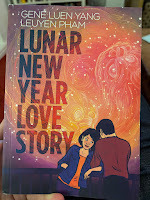 This is fantastic - the moving, funny, emotional tale of teenage Valentina negotiating loss and love. The Dr bought it for me as a Valentine's gift, having had it recommended by a friend, and I ripped through it last night, entranced.
This is fantastic - the moving, funny, emotional tale of teenage Valentina negotiating loss and love. The Dr bought it for me as a Valentine's gift, having had it recommended by a friend, and I ripped through it last night, entranced.As a child, Valentina loves Valentine's Day more than Christmas and makes cards for her classmates at school, while chatting to her Cupid-like imaginary friend "Saint V". But in her teens, she comes to discover that this close association is the result of a whole load of other things going on in her early life of which she wasn't quite conscious - the statue of St Valentine at the Catholic church that her grandmother attends and some other things I won't spoil.
At the same time, Val, who is from a Vietnamese family, is part of a wider Chinese community in this unnamed part of the US, and takes up lion-dancing in part as a step up from her childhood ballet classes and in part because a particular boy is involved. The lion dance has its own mythology, which interweaves with that of St Valentine. In practice and performance, she learns to keep in time with her co-performer and also to recognise when they're not quite in step.
It's brilliantly well observed, from the cultural specifics (one character takes a rice cooker with them on holiday!) to the cringe of inter-personal politics at school. I laughed out load several times. But it also perfectly captures the raw energy of teenage emotion. Some characters are horribly selfishly but most mean well while doing things that affects others badly. It all feels specific, grounded and real, even though it's about the way that ghosts and spirits haunt our everyday lives and help us to reflect and heal.
In all, this is a joy to read, beautiful to look at and the coda of a few extra panels placed around the closing acknowledgements and indicia really got me. Wow.
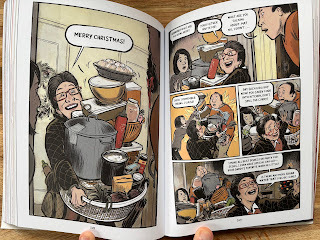
February 13, 2025
A Masterpiece in Disarray - David Lynch's Dune an Oral History, by Max Evry
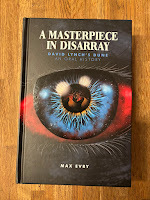 On Thursday, 16 January, I received from a kind friend this enormous 500+ page book on the David Lynch version of Dune — a film we both find extraordinary. It’s a beautiful hardback edition, the pages edge-painted in sparkly red (which impressed both my children). I went on to Bluesky to enthuse about this gift and discovered Lynch had died. “He’d appreciated the timing,” responded one of my other pals.
On Thursday, 16 January, I received from a kind friend this enormous 500+ page book on the David Lynch version of Dune — a film we both find extraordinary. It’s a beautiful hardback edition, the pages edge-painted in sparkly red (which impressed both my children). I went on to Bluesky to enthuse about this gift and discovered Lynch had died. “He’d appreciated the timing,” responded one of my other pals. I started the book that afternoon but, like the film (and the novel it’s based on), it’s a vast sprawling epic and has taken a while to get through, not least because I’ve had a whole bunch of work stuff going on, too. Evry tells us at the start that he ordered the wealth of information so that we can skip to the bits of interest, whether that’s his detailed histories of pre-production, filming and what happened afterwards, the huge oral history of interviews with cast and crew, or the extra stuff like the merchandise and legacy of this peculiar, beguiling movie. I am hardcore and did the whole lot.
At first, I thought the book might have been better edited, even judiciously pruned, as there’s quite a lot of repetition. But as I read, on the repetition became important to our understanding: these are things on which people agree, in contrast to the many points on which there is less consensus.
Some witnesses, such as costume designer Bob Ringwood, are engagingly gossipy and forthright in their views. Others are more cautious in what they share. That is especially telling when their accounts are combined. For example, there’s the account of one male actor getting into character on set by shouting at and upsetting co-star Francesca Annis. Annis, cited in a contemporary interview (she did not contribute to this new book) declines to name the male actor. But here, publicity executive Paul M Sammon does (p. 223).
This is immediately followed by a contribution from another cast member, Sean Young, who doesn’t name the male actor or refer to the incident specifically. Yet by placing her words directly after Sammon, the implication is that she’s telling us what happened in response on set.
“As an actor, when I’m working with other actors, we all know who’s the deadwood. We all know who it is. We may not say it, but we’ll avoid them.” (p. 224)
There’s loads I found fascinating here. Val Kilmer and Tom Cruise screen-tested for the lead role of Paul. MacLachlan walked off set several weeks into filming because he’d still not received a contract. The rubberised stillsuits created for Dune were a big influence on Michael Keaton’s costume as Batman — also realised by Bob Ringwood — and superhero costumes ever since. Production on Dune overlapped a bit with Conan the Destroyer, using some of the same locations and sets, and at one point you could see both out in the desert on facing dunes. There’s stuff on the music and marketing and merchandise… There is a lot of detail.
These details could have been summarised or more concisely related but that would be missing a big part of the appeal of this book. A bit like the documentary Get Back where we sit day after day with the Beatles, the joy here is all the mundane, ordinary stuff as well. It’s the granular detail that really opens up the creative process. We gain a strong sense of what Lynch was doing, what he tried to achieve and what exactly went wrong.
A few days after receiving the book, I watched the movie with my teenage son, who had seen the Villeneuve Dune and Dune: Part II but came to this old film wholly new. He enjoyed it, I think, and found it interesting to see a different take on the same material, but his main issue was that the last hour or so is too rushed, too much happening too quickly for it to have an emotional impact. That, I now learn from reading this book, is because the production shot largely in script order; when money began to run out, they ripped our whole pages of what they still had to shoot…
Insights into the production and thus what we see on screen only take up the first half of this enormous volume. Evry has just as much interest in what followed, picking over the way the film was released, seen and received. More than that, there’s the sense of how it has haunted (or not) the people who made it.
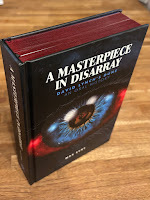 Now, this is an oral history — it says as such on the cover — and memory can be a bit fallible. Evry does a good job in outlining the history as he understands it and then letting the people involved have their say, whether or not that contradicts the “facts” or other contributors. I think sometimes what people say could do with a little more interrogation. For example, we learn how one particular design was inspired by a trip Lynch made as the guest of producer Raffaella De Laurentiis and her movie mogul father Dino. But we’re told that,
Now, this is an oral history — it says as such on the cover — and memory can be a bit fallible. Evry does a good job in outlining the history as he understands it and then letting the people involved have their say, whether or not that contradicts the “facts” or other contributors. I think sometimes what people say could do with a little more interrogation. For example, we learn how one particular design was inspired by a trip Lynch made as the guest of producer Raffaella De Laurentiis and her movie mogul father Dino. But we’re told that,“Dino took him [Lynch] and Raffaella on an impromptu (and speedy) car trip to Venice, arriving directly in St Mark’s Square.” (p. 61).
That’s not technically possible given how Venice doesn’t have roads. Besides, Bob Ringwood then tells us that they all arrived by plane (p. 111).
Since I’m quibbling over small stuff (minuscule!), we’re frequently told of scenes being “lensed” or hear of “lensing” as a synonym for shooting. I don’t think that’s ever in a quotation from cast or crew; it’s a term used by movie journalists rather than those who make movies, not least because you fix or modify a “lens” before you start the action. Referring to Lynch as “the helmer” rather than director is another journalistic cliché, and not quite appropriate in this case since a key element of the story is how Lynch wasn’t in overall charge of what made it to the screen.
At times, the prose is oddly colloquial, too. When discussing the possibility of a director’s cut of the movie, we’re told that Lynch was “initially enthusiastic about taking a mulligan”, which I had to look up (it means when a golfer is allowed to replay a stroke), and then that “the studio refused to pony up the right amount of dough” (both quotations, p. 293). That is quite the mixed metaphor.
I raise this because the book is otherwise so often very good at explaining simply and clearly what were very technical procedures, such as the way the film was financed or the then-pioneering special effects. It makes us understand exactly how ingenious and revolutionary a lot of this stuff was for it’s time, as well as how influential. But also I am a jaded old hack who finds such grammatical stuff distracting and what I really want — in this book, in the film — is to lose myself in the weird, rich world of Dune.
Pedantic quibbling aside, this is an extraordinary, rich and insightful book. I’m tantalised by the details that remain elusive: how much footage actually survives; how possible it would be, with some new effects work, to produce a director’s cut, and how much of a screenplay for Dune II Lynch may have written.
The book ends with a short, sweet interview with Lynch himself, who just wants to say how much he enjoyed working with cast and crew for all he doesn’t much rate the film. My sense is of Evry trying valiantly to keep the call going, to draw more from Lynch and to somehow articulate something of what Dune means to him, the author of this exhaustive book. “Fantastic, man,” says Lynch, cheerily, and ends the conversation.
We’re left hanging. Now we always will be.
See also:
Me on Dune: Part II (2024)Me on The Making of Dune (1984), by Ed NahaMe on the novel Dune, by Frank Herbert"The sleeper must awaken: inside the mind of Dune", my essay for the Lancet PsychiatryJanuary 30, 2025
Doctor Who Magazine #613
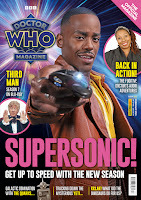 The new issue of the official Doctor Who Magazine is out today, with news of who is writing episodes of the forthcoming TV series plus a new column by Gary Gillatt, this time on the subject of dinosaurs.
The new issue of the official Doctor Who Magazine is out today, with news of who is writing episodes of the forthcoming TV series plus a new column by Gary Gillatt, this time on the subject of dinosaurs.I've written a couple of things:
pp. 18-22 Script to Screen: The Time Hotel
Digging into the design work on the most recent TV episode, I spoke to executive producer Joel Collins, visual effects supervisor Seb Barker, production design Phil Sims, graphic designer Stephen Fielding and assistant graphic designer Sophie Cowdrey.
pp. 48-50 Get Ready to Play
I spoke to the team behind mobile Doctor Who game Lost in Time: Elin Jonsson (Chief Business Officer at East Side Games); Joao Batista (CEO of Bigfoot); Mario A Mentasti (narrative designer at Bigfoot); and Shannon Maclaughlan (BBC Studios).
Then, on p. 32, there's an interview with me (a whole paragraph) about the documentary I've made with Jon Clarke for the new Season 7 Blu-ray, with a photo I took on p. 33. More about Terror of the Suburbs another time...
Simon Guerrier's Blog
- Simon Guerrier's profile
- 60 followers



